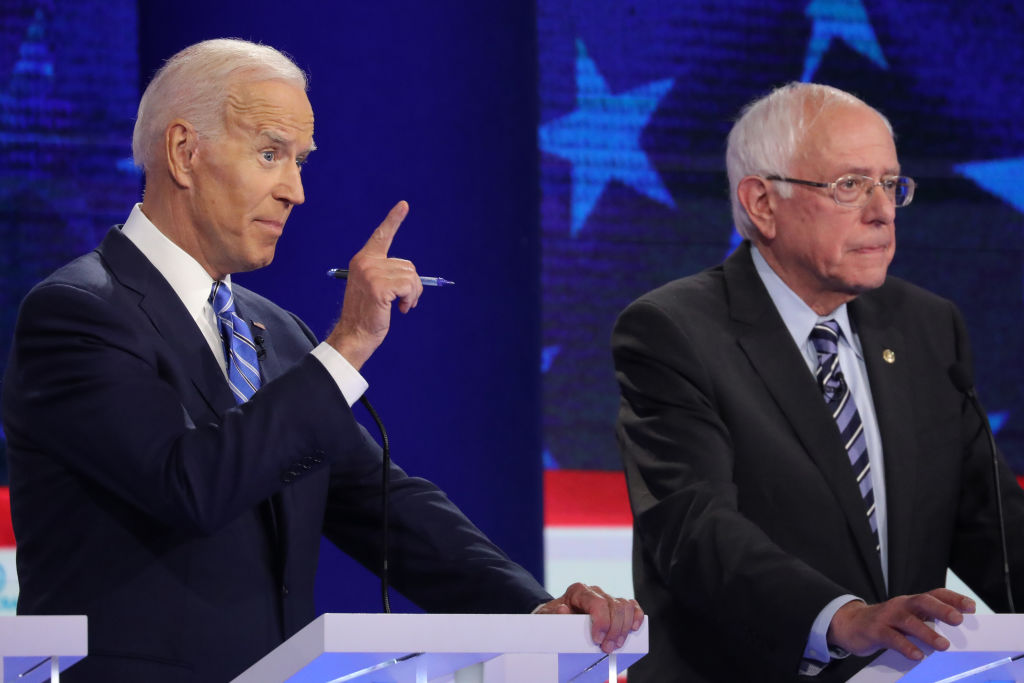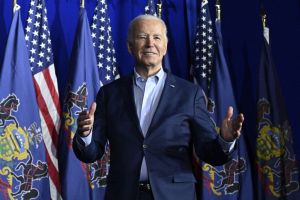Joe Biden bled last night. Kamala Harris slashed him to ribbons over his opposition to busing and his kind words for long-ago segregationist colleagues. But Harris, who has a knack for turning left-wing dogmas into vivid images and personal stories, made only the most generic of pitches on her own behalf in her closing statement.
Most of the other officeholders on stage were similarly uninspired. Bernie Sanders was a bracing alternative to Hillary Clinton four years ago. But his message is now just repetition—nothing makes him a different or better candidate than he was in 2016, even as the country has changed profoundly and the field of rivals he now faces is nothing like the one-on-one race with Clinton.
Pete Buttigieg had the best night after Harris, yet he too broke no new ground. He’s smart, confident, but not in the end much different from all the rest. There is hardly more variety in this 10-candidate field than there was in just the two-candidate Clinton-Sanders race four years ago. The Democrats are stuck in a rut.
This is a party on the verge of making the same mistake that the Republicans made almost 30 years ago. The GOP faced a crisis after Ronald Reagan left office: he had made the party conservative, which in practice meant that the formerly less-than-conservative politicians of the party now had to pretend to be something they never wanted to be. George H.W. Bush was no Reaganite. But he ran as if he were another Reagan in 1988, only to lose in 1992 once the difference became obvious. For the next 20 years, fake Reaganism was the official ideology of the GOP. Then in 2016, Donald Trump swept away a field full of candidates who knew their catechism but had no faith: conservative candidates who recited all the formulas about what conservatism meant for trade policy or foreign policy or immigration compromise, yet who had no sense of what policies would actually serve the working and middle classes of the country. They were great ideologists and lousy statesmen.
Barack Obama was not the Democrats’ Reagan, but like Reagan he represented a chance for his party to change at a pivotal moment in the country’s history. The post-Reagan Republicans blew that chance, and the post-Obama Democrats are blowing theirs, too. Joe Biden is the perfect symbol of that: he’s as much Bob Dole as George Bush, and to the extent he’s a George Bush, he’s the defeated Bush of 1992, not the victorious one of ’88. Biden is just the next guy in line to be the party’s nominee, the inevitable heir, a third term for Barack Obama. But like Bush in ’92 or Dole in ’96, this nostalgia isn’t enough. Already by the early Nineties America was a different country from the one Reagan led, with a radically different, post-Cold War strategic environment, and related to that a radically different economic challenge, that of maintaining the national quality of life in the face of the globalizing forces that had originally been unleashed as a Cold War tactic. Japan, then China, posed a threat to America’s workers. The high-tech boom of that era disguised the danger for a long time, though Pat Buchanan, for one, saw through the mirage. Republican leaders ignored his warnings and kept on faking Reagan.
The fake ideology of the Democrats today, unfit for the realities of American life, is technocratic and politically correct. All of the Democrats on stage Thursday are adherents of this ideology, just as all the Republicans who lost to Trump in 2016 were adherents of fake Reaganism. The technocratic side of the Democrats can be seen in their plans — most of them vague — for efficient new programs to supplement or replace private health insurance. Obamacare and Medicare for All are the benchmarks for this: the former is based on a Mitt Romney Republican healthcare plan enacted in Massachusetts 13 years ago, while the core of Medicare for All is a program founded over a half-century ago, in 1966. Neither a refined Affordable Care Act nor Medicare for All has much political plausibility — they smell exactly like the Republicans’ decades-long, doomed dream of privatizing Social Security. Ideology demands that a problem have a solution, and the solution be technical and consistent with the ideology’s foundations. But the realities of politics — coalitions, opposition, consensus-building, and popular persuasion — are all ignored or taken for granted. Barack Obama got the Affordable Care Act through the House of Representatives by a margin of just seven votes, after the historic Democratic victories in the 2006 and 2008 elections. The chances for a more ambitious healthcare reform based on old models seem remote. Yet the Democrats last night made such plans a centerpiece.
The Democrats were as one in denouncing Donald Trump’s immigration policies and wanting to see illegal immigration decriminalized and an end to present detention policies. But again there was a profound disconnection between ideology and circumstance: failing to police the border is not really an option, certainly not as far as voters are concerned; but any serious attempt to deal with the present crisis will involve measures stiffer than those employed by Barack Obama (when the problem was less severe) and not altogether unlike those employed by Trump (which are in some cases simply magnifications of Obama policies). Democrats behave as if the border doesn’t matter and fraudulent claims of refugee status pose no difficulty not because voters share those beliefs but because ideology demands it. Ideology might as well be a script, and the 10 candidates on stage last night were the actors. They improvise a little around the edges; they may play different parts. But there is nothing surprising or open to revision — or to the intrusion of reality — in any of what they say or do. The contrast with Trump could not be more striking. Everything he says and does is unscripted, inappropriate by the standards of well-disciplined thought. Yet he often expresses otherwise unutterable truths, especially about American foreign policy and trade relations.
Farfetched healthcare ‘plans’, de facto open borders, and a whole lot of mush about fighting climate change, upholding abortion rights, and soaking the rich while cutting taxes for the middle class — not a whit of it bespeaks inspiration or fresh engagement with American life. Kamala Harris the ruthless California prosecutor now plays the role of compassionate advocate for illegal immigrants.
It’s about as convincing as George H.W. Bush reciting supply-side platitudes. Read her lips: no new immigrant detention centers. Biden, meanwhile, as he tries to navigate the ideology of the woke era, seems more befuddled than Bob Dole was in 1996 as he tried to fumble his way through the GOP’s new pro-life orthodoxy.
Biden, Harris, and the rest will do and say what is necessary — that is, necessary within their party’s climate of opinion, regardless of whether it has any bearing on the drug and suicide epidemics and the endless, pointless wars that are routine features of the American experience heading into the third decade of the 21st century.
If Biden is Bob Dole, Sanders is Phil Gramm — the true believer whose message has little appeal beyond the faithful, in large part because it is just so narrow. Socialism and technocratic government are ideological reflexes, not creative responses to the ills of today.
The Democratic Party is exhausted. With 10 candidates on stage Thursday, after 10 others had taken the stage the night before, nothing substantially new emerged. The politics of recitation is enough for ordinary times, perhaps, but this is an America in the midst of serious change — of a sort that requires thinking about entirely new configurations of politics. Ironically or not, Republicans and conservatives are the ones who have taken up that task: the right is untamed and innovative today in a way that it hasn’t been since Reagan left office, and in a way that the left won’t be until it breaks away from the predictable politics of Thursday’s dreary debate.


















